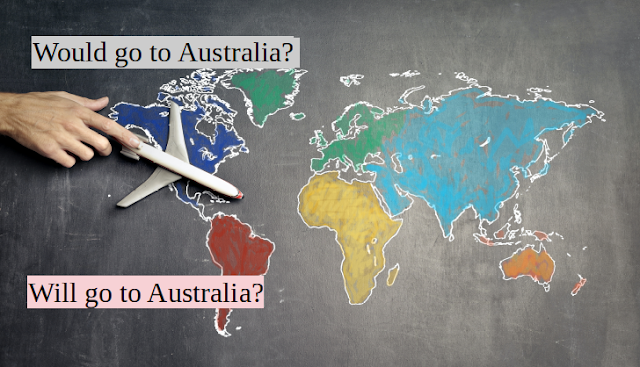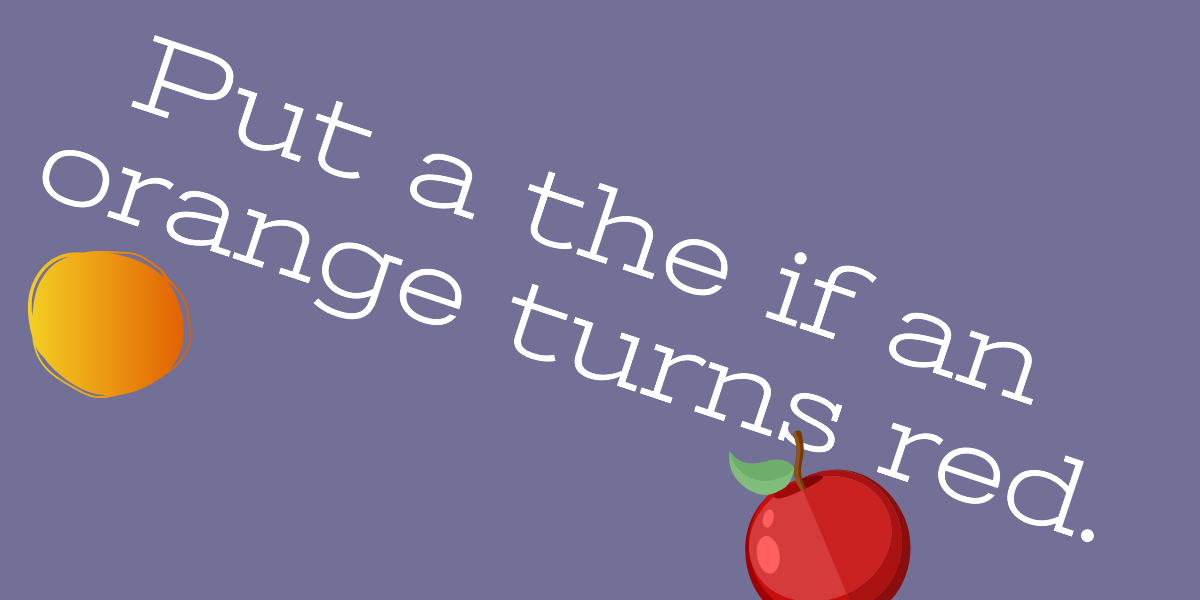The subtle difference between 'will' and 'would'
For too many times, ‘will’ is used when ‘would’ is the right choice. Is that a problem? Yes, since misplacing ‘would’ and ‘will’ can change the meaning of a sentence drastically. For that reason these two words deserve a little more attention.
What do I mean by using ‘will’ instead of ‘would’? Let’s consider the following examples.
Here is a context. Two girls are having lunch at a restaurant while taking about their boy friends. The first girl mentioned that her boyfriend eats a lot of meat. The second girl got surprised hearing that and asked a question.
“Why would he want to eat so much meat?” asked the second girl
“I don’t know . But it would be fun to see him in a slaughter house.” said the first girl.
Let’s consider the 2nd one first. The 2nd sentence could be like the following:
It will be fun to see him to a slaughter house.
What’s the job of ‘would’ in the first sentence?
In the first one, ‘would’ is used to ask the reason behind his eating so much meat. And, expressing or asking a reason is one of the uses of ‘would’. But if you dig deeper, you will discover that the word ‘why’ indicates some sort of IMAGINATION. In this case, the reason of someone’s fetish for meat, which the girls don’t know. And by asking with ‘why’ , she is using her imaginary power or curiosity.
The point is imaginations takes various forms. Hence there are many uses of ‘would’. So look for which are imaginations and which are not ( such as promise, determination, plan). ‘Would’ is mainly for hypothetical situations.
Difference in meaning between will and would
‘Will’ indicates the future and adds certainty about future situations. ‘Would’, on the other hand, indicates imaginary situations. What confuses us the most is that very often the imaginary situation feels like the same as the future. We have to develop a sensitivity between the two situations to correctly use ‘will’ and ‘would’. Imaginary situation are coming out of our brains. So ‘will’ is for real future situations, and ‘would’ is for imaginary situations. lets see some examples to get a feel of what we have just read.
I will go to school tomorrow.
I would go to school.
In the first one, ‘will’ is indicating the future. Also there is no doubt in my mind about going to school. While in the second case, I am not straight forwardly saying that I am going go to school. There is a ‘BUT’ involved in the second one and it is understood by the listeners. In the second case, the incident (going to school) happened in my imagination. Hence ‘would’. The sentence would have been easier to understand if the below part had been added to it.
I would go to school if the teacher gave me no homework.
So
my going to school is depended on something else. That is the ‘but’.
That is why the context is important in understanding sentences with
‘would’.
Being modal verbs, both ‘will’ and ‘would’ have multiple meanings unrelated to each other. So it’s better to count ‘would’ as an separate verb unrelated to ‘will’. The various uses of them might help.
The usages of would
Besides the main use of ‘would’ (describing the result of an imaginary situation), there are various other usages of ‘would’. A clear understanding of them is required to recognize which meaning of ‘would’ is used when you are reading a newspaper article.
1. would to describe an imaginary event or its result
Forgetting to pick up the passport would be a disaster.
Going to Greenland and become a fisher man would be dream come true.
Here we are not talking about a future time when we will go to Greenland. Jus wondering. Hence ‘would’. Same for the first two.
We can also ask question about imaginary events. Like:
How would the politician get fund for that expensive vacation?
How would you describe her?
2. Would to say what is likely or what is expected
He is the director of the firm. He would know the amount of profit.
That secret operation of capturing aliens was of heavy risk. It would have been required a presidential approval beforehand.
In the second one ‘would have’ indicates it happened in the past as well as the likeliness of requiring an approval.
3. Would used in request to show politeness.
Would you please show me the correct way?
Would you mind lending your pen?
4. ‘would’ to express a wish that you want to happen
She wishes the rain would stop.
I wish tomorrow would be easier.
5. Would to ask the reason behind something
Why would you read so much, doesn't it hurt?
Why would anyone want to steal a dog?
At this point we can establish a pattern: There is an element of ‘imagination’ present in all of the above usages. When you say what is likely or ask about a reasoning, you are certainly imagining something. Even in requesting someone to do something or expressing a wish we use our imaginations.
6. ‘Would’ indicates future time while describing a past event
The soldier lost his helmet in a battle, which would be found by his son two years latter.
It’s like going back to the past and describing the already known fact about the future.
7. Would to indicate what someone thought was going to happen
I thought the house would collapse on me.
They expected there would be a good rain
I would take tea over coffee.
I would like to have a apple for lunch.
7. Would in giving opinions
I would say she is a little shaky today.
I thing it would take three days to cross the jungle.
8. Would to mean past habits
I would prayed for the rain to come in the summers of my boyhood.
My friends would play cards in the Corona lock-downs.
9. Would as refusal in the past
My five-year-old just wouldn’t eat in the morning.
In the middle of road the car broke down and wouldn’t start again.
10. Would in 2nd and 3rd conditional sentence
If the group had the proper weapon, they would destroy the whole county.
If the gang leader had not been given a bell, the massacre would not have happened.
The usages of will
1. The main use of ‘will’ is to talk about the future plans, and promises. Also there is an element of certainty in that. Like:
The company will make a big plant in the costal area.
I will help you doing the work.
I hope this bait will catch a big fish.
2. Ability or willingness or intention
You are not a husband if you will not carry the big bag.
The uncle will look after the kid. (willing)
The kid will not eat at all. (refusing to eat)
The fake conditionals
Sometimes sentences with ‘would’ and ‘if’ in it can be deceptive. It gives a conditional sense but actually it is not a conditional sentence. Let’s look at another example:
She would do whatever I say her to do even if it goes against her beliefs.
The ‘even if it goes against her beliefs’ clause emphasizes her willingness to do what I say. In another word, her action is not depended on whether it goes against or for her beliefs.
Mixing the conditionals
Here is an example:
If the court gives an injunction order, the mining company would not be able to mine gold.
So it doesn't maintain the structure of either of the 1st or 2nd conditional. It’s not even a mix conditional( 2nd + 3rd). You won’t even find this type of construction in the Grammar text books even in dictionaries. No doubt it is confusing. But it appears regularly in newspapers; in fact the above sentence is inspired by a newspaper article.
If the court gives an injunction order, the mining company will not be able to mine gold.
Or,
It the court gave an injunction order, the mining company would not be able to mine gold.
Both of them are correct as conditional, but the writer did not mean either of them in the original sentence. Actually by putting ‘would’ instead of ‘will’( which express certainty), the writer wanted to mean that the company may has to stop mining. It just means the likely outcome, which is another use of ‘would’ as mentioned before in serial 11 of the usages of ‘would’.
Get the context to deal with would
Losing Texas to Mexico would not be an insult to the U.S.
Think about the speaker’s point of view. What the speaker actually want to mean? In the speaker’s mind Texas is still not lost to Mexico. He is imagining Mexico’s taking over Texas. Though it is a distance possibility, it is still a possibility. If you want a number, I would say it is 2%..
There are two parts in this sentence. 1. Losing Texas to Mexico 2. would not be an insult the U.S. The speaker imagines a situation and then using ‘would’ to describe the result of the imagined situation.
So whenever we are taking about an imaginary future or present situation, we can use would. like:
It would pretty hard to learn coding.
Here what the speaker is actually saying ,in his imagination, if he started learning coding now, it would be difficult for him. So the takeaway from this sentence is the ‘if part’ of a ‘would’ sentence could be omitted in many sentences. And you have to know the context to understand what the ‘if clause’ meant.




Comments
Post a Comment